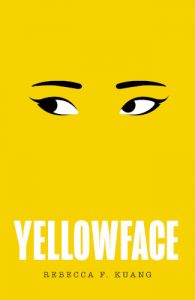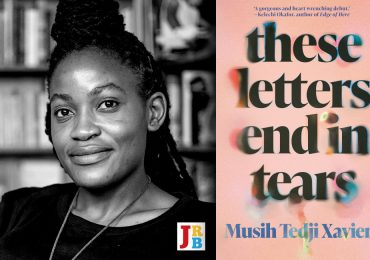In Yellowface, the contrast is turned up so brightly that the shadows disappear, writes Wamuwi Mbao, but it’s the darkness that gives meaning to what we see.

Yellowface
Rebecca F Kuang
HarperCollins Publishers, 2023
There’s a problem with Yellowface, the breathtaking new satirical novel from Rebecca F Kuang. We’ll get to it later. Kuang’s book has garnered a giddy amount of interest for the way in which it skewers the structural inequities of the book publishing industry. If you’re interested in that sort of thing, you’ll have seen much insistence from the febrile realms of Book Social Media that this book is a must-read, the book of the moment, the book that spills the tea on the wretchedness of the book industry.
Treat such calls with circumspection. Every trade, especially the hermetic ones, fancies itself more important to public life than is actually the case. ‘Must-read’ is simply a way of telling you that a work lends itself to conversation. The fashion for novels that tell us exactly How Things Are shows little sign of abating. We’ve had the Age of Online Anxiety novels, the Pandemic Novels, The Age of Extinction Novels, and enough Writing About Writing/Not Writing autofiction novels to shake a stick at. Circumstance is always producing ever more deeply serious, deeply unique voices (they all either originate in the Ivy Leagues or are magnetised there shortly before their eminence is imminent). But just as you could proceed through life happily without ever watching White Lotus, Succession, or whatever else the cultural north winds blow your way, you could probably get along just fine without reading Yellowface or whatever the noisy publicity machines decide is the next needful thing for you to give your attention to.
Yellowface is, to be sure, a disquieting read. It’s a story as incandescent as its cover, one that is ultimately as much about the loneliness of the writing craft as it is about theft, appropriation, guilt and complicity. The tale coils around the plagiarism of a half-finished manuscript, but in execution, it emerges as a rather aerated story which is more pith than fruit. Running to three-hundred-and-twenty-odd pages, the novel is an immersive jangle of commentaries on the exploitative nature of the publishing and writing industries. While the things that have drawn readerly attention (the discussions of cultural appropriation, the violence of whiteness, the overdetermining question of what writers should be allowed to write about) are important to how we read the text, Yellowface also holds space for important reflection on the alienation and loneliness of the writing craft, on the difficulty of the creative impulse. And these aspects linger with the reader long after the tang of the story has dissipated.
June Hayward, the novel’s white woman focaliser, is a milquetoast career-novelist whose career drowns in the shallows after her debut, a forgettable coming-of-age story called Over the Sycamore, fails to make any impact. She spends her days watching in jealousy as her college friend Athena Liu, an Asian American woman, becomes the talk of the (literary) town. Athena has three successful novels to her name, and a Netflix deal on the horizon (it should come as no surprise that Yellowface itself has the energy and rhythm of a Netflix series. Tudum). She is, to June’s mind, everything June is not:
Athena Liu is, simply put, so fucking cool. Even her name—Athena Ling En Liu—is cool; well done, Mr and Mrs Liu, to choose a perfect combination of the classical and exotic. Born in Hong Kong, raised between Sydney and New York, educated in British boarding schools that gave her a posh, unplaceable foreign accent; tall and razor-thin, graceful in the way all former ballet dancers are, porcelain pale and possessed of these massive, long-lashed brown eyes that make her look like a Chinese Anne Hathaway (that’s not racist for me to say—Athena once posted a selfie of her and ‘Annie’ from some red carpet event, their four enormous doe eyes squeezed side by side, captioned simply, ‘Twins!’).
June’s description of Athena, of course, tells us little or nothing about Athena, and much about June’s consuming gaze: she is indeed quite racist. Her curdling obsessiveness with Athena is disconcerting, because it feels so true in its quiet, purpling watchfulness, in where it assigns value, in its summary judgements. She thinks Athena gets everything handed to her, and her sense of entitlement generates a foaming resentment:
So of course Athena gets every good thing, because that’s how this industry works. Publishing picks a winner—someone attractive enough, someone cool and young and, oh, we’re all thinking it, let’s just say it, ‘diverse’ enough—and lavishes all its money and resources on them. It’s so fucking arbitrary.
June fervently believes that her lack of success and Athena’s soaring fame are intertwined. All her saltiness doesn’t stop June from hanging out with Athena, even as their literary careers take distinctly divergent paths. It is while they are celebrating the Netflix deal in Athena’s swish apartment that tragedy’s scythe descends. Athena dies in a freak accident, and by sheer ‘arbitrary’ chance, June is given the means to refashion herself. The manuscript Athena shows her shortly before she dies—a potent epic about the World War I Chinese Labour Corps and their mistreatment by the allies to whose war they were contributing their efforts—also, conveniently, exists only in paper form, with no copies, no digital drafts. It’s a banal plot contrivance (three novels in, and her process is so terrible?), but c’est la guerre.
June takes it upon herself to doula the incomplete manuscript shown to her by Athena: she steals it and covertly begins to Polyfilla her own prose into the book. This produces some of the most horrifying moments in the novel, as she blithely slashes and burns at Athena’s work, guided by her own limited sense of the world. She imagines herself inhabiting the writerly soul of Athena, but the book that emerges tells us that June’s faith in her writing ability may be misplaced. June’s vandalism produces a ghastly caricature of Athena’s work, all the corrective labour bowing to June’s white, bowdlerising sensibilities. The resulting work is nonetheless seized upon by her publishers. It’s just the right sort of book for an imagined white audience: informative at the level of a tourist brochure; not so accusatory as to make them feel bad about themselves.
June’s infidelity to Athena is the spark that starts a literary bonfire. Rebranded by Eden, her publishing house, as the ethnically ambiguous ‘Juniper Song’, June’s swift rise to fame is a superlative study of whiteness at work in the world. She accepts the avalanche of success and adulation that comes her way. What follows is a dreadful onrush of riches and acclaim, followed by a long, painful unmasking when cracks begin to show in her story. Kuang lingers on the spectacle of June’s fall from grace, a fall in which June (deservedly) hits every branch on the way down. Naturally, the reader might ask how it takes as long as it does: surely an entire industry wouldn’t be fooled by such low-grade legerdemain? The novel’s magical thinking is not quite magical enough to sustain this, but it makes a depressingly credible point about who gets believed, who gets the benefit of the doubt, and who is ignored or treated as the problem when they complain.
June’s voice is diaristic and confessional throughout, and this lends the narrative an uneasy intimacy, particularly at points where we glimpse the terrible desolation of the writing life. June is always close to grasping what the reader immediately perceives about herself and Athena: that, regardless of who succeeds and who fails, they are united by the loneliness of their chosen lives, a loneliness that makes them unlikely bedfellows. The incongruity between what the actual reality might be and how June perceives things is poignant for the reader. But June is always too ready to see herself as the wronged party, and this is what damns her, in the end. The jigsaw pieces of the plot fall into place swiftly and rather predictably, and the whole thing ends not with a bang, but with a defiant whimper.
Kuang surely wants us to reflect on this most difficult of vantage points, and she has done well to get at the flashes that make a character three-dimensionally unlikable. At one point, an Asian American assistant at the publishing company that is bringing June’s stolen work to the world, raises the need for a ‘sensitivity read’: her alarm is obvious to the reader, who has by now discerned that June is oblivious to her own ignorance. The assistant is ignored, and when she later quietly voices her protest by giving the book a 1-star review on Goodreads, June plays the victim and has the assistant punished:
Hot vindication coils in my gut. Candice deserves it—putting the sensitivity read kerfuffle aside, what kind of psychopath would fuck around with an author’s feelings like this? Shouldn’t she know how stressful and terrifying it is to launch a book? I bask for a moment, imagining what kind of chaos I’ve sown over at Eden’s office this morning. And though I would never say this out loud about a fellow woman—the industry is tough enough as it is—I hope I got that bitch fired.
There are many such moments of June’s callousness in the novel, and her self-serving cruelty is at once banal and rattling when read from her perspective. One of the novel’s nagging questions is whether June would have ever been able to recognise Athena as a friend, given her obliviousness to the way she crashes through the world. As June goes to greater and greater extremes to keep her plagiarism from being revealed, her insistence on her rightness, her Macbeth-like determinedness to follow the business through to its bloodied conclusion, sees her digging a pit from which she will be unable to emerge.
To be sure, this is an engrossing novel, blessed with spark and vigour and underscored by a deeply cynical intelligence and no small amount of wit. The story glides along, borne aloft by Kuang’s richly flexible prose style. It’s a page-turner, but it isn’t an easy read: June is such a hatefully disagreeable character, so well-drawn in her artless victimhood and sociopathy. When suspicion erupts into outright vitriol, June finds herself drawn towards what threatens to destroy her. Here, Yellowface takes what might have been a leaden parody of Twitter and its famous pile-ons and places its main character right in the eye of the whirling storm. It’s all death threats and Big Takedown Energy, and it’s by turns horrible and amusing.
***
And yet, there are structural problems that take the polish off the novel. While Kuang is good at sustaining the vivid tension-and-reveal tempo, there are only so many times the fizzing fuse can be deployed before the reader’s patience begins to wear thin. The drama of all this will-she-be-caught suspense is a good idea indulged too often, so that it begins to feel like a repetitive docking point for each chapter. Similarly, June’s obtuseness stretches believability past its breaking point: too often, her unremitting badness feels cloying (truly bad people are happily unremorseful about their actions, whereas June is conveniently haunted—literally— by her deeds).
The other problem is one of time stretch. Novels written in the present moment must make the choice either to represent the Pandemic or reroute their timelines so as to avoid the messiness of too much reality. Yellowface manages the trick of feeling current, but there are moments of timeline yo-yo that tangle and pull at our suspension of reality. Given where she places herself (a child of the 2000s), how is it possible for June to bond with Athena as a young college student over Elif Batuman’s 2017 novel The Idiot? How has there been enough time from those college days for the near-decade’s worth of history we’ve read about to have transpired? It’s clumsily improbable, suggesting a belated editorial intrusion to try to situate the novel more accurately in the present.
The present is of course, a shifting foundation, and most attempts to taxidermy the online social energy come off a little glass eyed. The best of these—think Lauren Oyler’s Fake Accounts—still read a little bloodlessly. In Yellowface, the imagined Twitter universe that praises and damns, raises up and pulls to pieces, is a viewfoil tracing of the ‘real’ thing, where the outlines capture only what is most prosaic about the vaporous online world. It doesn’t seem possible to say anything clever about social media that isn’t also tediously obvious, like someone overenthusiastically describing a party you both attended.
The vexing question with a novel like this is one of fictionality. If the world in a novel too closely resembles our own, it ceases to have the purchase that is fiction’s great power. In this regard, Yellowface prompts me to ask: what meaning is this novel conveying? What is the substance beneath the brulée crust provocation? Nobody at this point should be genuinely surprised that the publishing industry is not immune to the racism and exclusion that continues to shape ordinary life. Those who need to be apprised of these facts will either not read this kind of novel, or will read it, grimace dismissively and move on.
Few contemporary novels have conveyed with such extraordinary clarity the enraging arrogance of white solipsism let loose on the world, and yet I read Yellowface with a sense of identification rather than revelation, and I closed it with a sense of faint dissatisfaction. That provocative cover with its averted eyes, that title: surely these things promised more than Yellowface delivered? The novel needs to reach beyond the grimly obvious facts (publishing is undergirded by networks of patronage and bias, having little room for stories that aren’t about white life in all its narrow unseeing immodesty) to get at what is meaningful for the reader. That is to say, it needs to give more than a brusque handshake to the social residues of anti-Asian prejudice in North America: the history of that prejudice is storied and complex. If it feels uncharitable to expect a book that makes so many incisive points to do more work than mere point-making, it is not uncharitable to wonder if the novel wouldn’t have been better if it didn’t feel like it was leaning against the proscenium arch a little too casually.
The larger problem is that satire has been fatally weakened by the ongoing depredations of the current moment. Then too, its power to do much beyond reportage is sapped through overuse. Think of the half-decade past, and novels such as Paul Beatty’s The Sellout, Chinelo Okparanta’s Harry Sylvester Bird, Mohsin Hamid’s The Last White Man, among others. In Yellowface the satire crackles and glows, but it never quite bursts into life. It’s good, but it’s also expected, agile, but entirely predictable.
Having spent so long telling you about it, I’ll end by saying that I think Yellowface is an excellent example of the reviewer’s least favourite thing: the novel whose self-conscious insights are both perfectly made and so obvious that they leave little room for discourse. Whatever its technical failings might be, Yellowface is fatiguing to read critically because all its positives and failings present themselves cleanly. This is the problem I alluded to at the start: the contrast is turned up so brightly in this novel, that the shadows disappear. Bu it’s the darkness that gives meaning to what we see.
- Editorial Advisory Panel member Wamuwi Mbao is an essayist, cultural critic and academic at Stellenbosch University. Follow him on Twitter.






I found that the interview Kuang does with Zakiya Dalila Harris in ‘interview magazine’ of May 2, 2023 clarified many aspects of this brilliant, multi-layered novel for me: in particular additional ways in which to read the two dislikable characters Kuang is (consciously – read the interview) targeting, June and Athena … all within the overdetermining, cynical compulsions of the mainstream publishing industry, which explains a lot about the behaviour of both. One of the issues that struck me quite forcibly about ‘Yellowface’ is the way in which it divides its reviewers and interpreters: huge praise on the one hand, and an uneasiness (never that well articulated) amongst its detractors. In my book, the latter on its own would means it’s had some success, politically speaking. My own view is that Kuang has managed to turn one or two of the major techniques of middlebrow literature against itself – especially the constant cliffhanger, to-be-almost-but-never-quite-resolved in the next chapter. After reading ‘Babel’ and this, I’m pretty taken with Kuang’s technical and intellectual abilities.